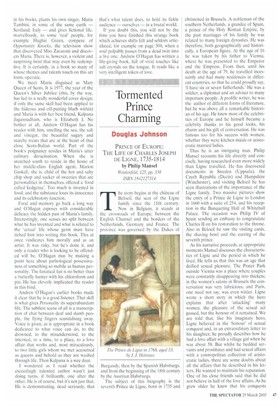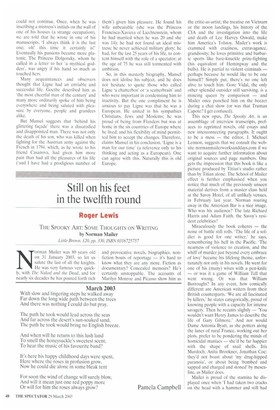Tormented Prince Charming
Douglas Johnson
PRINCE OF EUROPE: THE LIFE OF CHARLES JOSEPH DE LIGNE, 1735-1814 by Philip Mansel Weidenfeld, £25, pp. 338 ISBN 1842127314 The story begins at the château of Beloeil, the seat of the Ligne family since the 11th century. Now in Belgium, it stands at the crossroads of Europe, between the English Channel and the borders of the Netherlands. Germany and France. The province was governed by the Dukes of
Burgundy, then by the Spanish Habsburgs, and from the beginning of the 18th century by the Austrian Habsburgs.
The subject of this biography is the seventh Prince de Ligne, born in 1735 and christened in Brussels. A nobleman of the southern Netherlands, a grandee of Spain, a prince of the Holy Roman Empire, by the past marriages of his family he was related to many foreign dynasties. He was therefore, both geographically and historically, a European figure. At the age of 16 he was taken by his father to Vienna, where he was presented to the Emperor and the Empress. From then, until his death at the age of 79, he travelled incessantly and had many residences in different countries, so that he could proudly say, 'I have six or seven fatherlands.' He was a soldier, a diplomat and an adviser to many important people. A prolific writer, he was the author of different forms of literature, but he was above all a remarkable historian of his age. He knew most of the celebrities of Europe and he himself became a celebrity thanks to his good looks, his charm and his gift of conversation. He was famous too for his success with women, whether they were kitchen maids or aristocratic married ladies.
Thus he is an intriguing man. Philip Manse] recounts his life directly and concisely, having researched even more widely than Ligne travelled. He has discovered documents in Sweden (Uppsala), the Czech Republic (Deem) and Hampshire (Winchester), and visiting Beloeil he has seen illustrations of the importance of the Ligne family. Two massive pictures show the entry of a Prince de Ligne to London in 1660 with a suite of 254, and his reception in the Banqueting Hall of Whitehall Palace. The occasion was Philip IV of Spain sending an embassy to congratulate Charles II on his restoration to the throne. Also in Beloeil he saw the visiting cards, the shaving bowl and the earring of the seventh prince.
As his narrative proceeds, at appropriate moments Mansel discusses the characteristics of Ligne and the period in which he lived. He tells us that this was an age that deified sexual pleasure. The Prater Park outside Vienna was a place where couples were constantly disappearing into thickets; in the women's salons in Brussels the conversation was very lubricious; and Paris, one need not say, was even wilder. Ligne wrote a short story in which the hero explains that after 'attacking' many women, the pleasure of the sexual act passed, but the honour of it remained. We are told that, like his imaginary hero, Ligne believed in the 'honour' of sexual conquest and, in an extraordinary letter to his daughter, he proudly describes how he had a love affair with a village girl when he was about 58. But whilst he bedded servants and prostitutes and had sexual affairs with a cosmopolitan collection of aristocratic ladies, there are some doubts about all the affairs that he described in his letters. He wanted to maintain his reputation. One of his close friends said that he did not believe in half of the love affairs. As he grew older he knew that his conquests
could not continue. Once, when he was inscribing a mistress's initials on the wall of one of his houses (a strange occupation), we are told that he wrote in one of his manuscripts, 'I always think it is the last one; oh! this time it certainly is!' Eventually his passions became more platonic. The Princess Dolgoruky. whom he called in a letter to her 'a mythical goddess', was angry if his hand so much as touched hers.
Many acquaintances and observers thought that Ligne had an enviable and successful life. Goethe described him as 'the most cheerful man of the century' and many more ordinarily spoke of him being everywhere and being saluted with pleasure by everyone, people and grandees alike.
But Mansel suggests that 'behind his glittering facade' there was a dissatisfied and disappointed man. There was not only the death of his son, who was killed when fighting for the Austrian army against the French in 1794, which, as he wrote to his friend Casanova, had given him more pain than had all the pleasures of his life ('and I have had a prodigious number of them') given him pleasure. He found his wife unbearable (she was the Princess Francisca-Xaviera of Liechtenstein, whom he had married when he was 20 and she was 14); he had not found an ideal mistress; he never achieved military glory; he had, for the last 25 years of his life, to content himself with the role of a spectator; at the age of 75 he was still tormented with ambition.
So, in this masterly biography, Mansel does not idolise his subject, and he does not hesitate to quote those who called Ligne 'a chatterbox' or 'a scatterbrain' and who were important in condemning him to inactivity. But the one compliment he is anxious to pay Ligne was that he was a European. He united in his sympathies Christians, Jews and Moslems; he was proud of being from Flanders but was at home in the six countries of Europe where he lived; and his flexibility of mind permitted him to accept the changes. Therefore, claims Mansel in his conclusion, `Ligne is a man for our time' (a reference only to his thinking and acting as a European). One can agree with this. Naturally this is old Europe.









































































 Previous page
Previous page